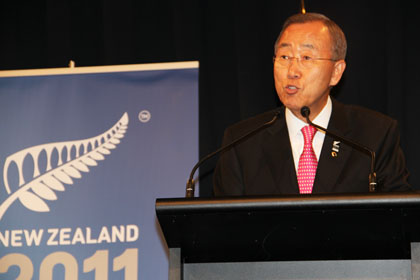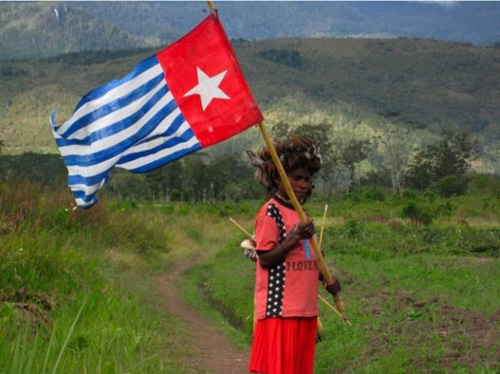Is Indonesia about to lose its grip on the western half of New Guinea, a territory the size of France and ancient homeland of the Melanesian West Papuans?
Addressing questions at a press conference in New Zealand yesterday, the Secretary-General of the United Nations, Ban Ki-moon, made the following statement:

United Nations Secretary General Ban Ki-moon at today's press conference in Auckland. Photo: Henry Yamo / PMC
“Again this issue should also be discussed at the Decolonisation Committee of the United Nations General Assembly. And when it comes, again, to whether you are an independent state or non self-governing territory, whatever, the human rights is an inalienable and fundamental principle of the United Nations. We will do all to ensure that the people in West Papua, their human rights should be respected.” [1]
To read of West Papua being raised in the context of the UN Decolonisation Committee by the Secretary-General is quite startling, for one specific reason: West Papua was removed from the list of colonised territories in 1969. This is unlike the situation in East Timor, which had not been removed from this list, becaming the trigger for their 1999 vote on self determination.
East Timor was a clear case of invasion in 1975, brutal suppression by a foreign power and liberation in a baptism of blood and fire in 1999. On the other hand, the West Papuan people were the victim of a brutal play of Realpolitiks during the Cold War.
After Indonesia gained their independence from the Dutch in 1949, Holland retained their territory in western New Guinea, preparing the indigenous population for independence. In 1957 Australia signed an agreement with the Netherlands to work toward the independence of the whole island of New Guinea and many Australians were involved on the ground in this preparation. [2]
In 1961 the Dutch administration formed a local parliament, including indigenous representatives and raised the West Papuan morning star flag, which flew along with the Dutch tri-colour across the territory and 1970 set as the year of independence. In this bright dawn of Papuan democracy, Australia helped to raised the hopes and expectations of the people of West Papua for freedom and self-determination.
Since 1949 Indonesia had been demanding control of the western half of New Guinea, even though it was, like the eastern half of the island, an ancient Papuan land. The Indonesian response was now to begin invading and a full-blown war with Indonesia appeared imminent, in which Australia would have fought along-side Papuans trained by the Dutch to defend their island homeland.
Wishing to avoid being drawn into a war with Indonesia, the United States intervened and told the Dutch to get out, Australia to butt out and gave the green light for Indonesia to take over half of New Guinea, as the new colonial master. This was deeply humiliating for the Netherlands and also Australia and brought into question the true independence of Australian foreign policy.
In this play of Realpolitiks, West Papuan lives, land and resources were used by Washington to buy a nominally pro-Western alliance with Indonesia and also access to Indonesian and Papuan resources. This action was nothing short of a slave trade and theft of land and property on an unimaginable scale.

The West Papuan morning star flag, which first officially flew in New Guinea in 1961, when Australia was working on the ground with the Dutch toward the independence of the whole island of New Guinea.
Indonesia became the new colonial power in New Guinea in 1963 and the atrocities began, with as many as 400,000 Papuans being killed in an ongoing genocide, which has pushed the Papuan aside to make way for Indonesian occupation and immigration. When a vote for self-determination was held in 1969, the United Nations allowed Indonesia to run it completely and even the UN observers on the ground only witnessed 20 percent of the vote.
Could it be called a vote, when 1025 selected men were lectured under the shadow of guns, before being invited to step over a line drawn in the dirt? An armed rebellion was going in in West Papua at the time. Wishing to avoid the prospect of war with Indonesia, most nations voted to allow West Papua to be incorporated into Indonesia and be removed from the list of colonial territories. A few newly independent African nations objected.
Would the United Nations get away with such a vote today. Such a bizarre process would not have been accepted in East Timor in 1999.
If the West Papuan people deserve natural justice, then they have a right to a genuine vote on self-determination. If Indonesia wishes to hold its head high as a truly democratic nation, then they will agree to this happening. If Australia wishes to regain honour with West Papua, then we will support the rights of the West Papuan people to self determination, just as we did the East Timorese and the Papuans of eastern New Guinea.
Sadly, all Australians have blood on our hands when it comes to West Papua, because we did not stand and demand justice, but went along with a brutal theft, slave trade and on-going atrocity Just across our northern border, many West Papuans have been shot on sight for raising the morning star flag, or sent to jail for 20 years.
Filep Karma was jailed for 15 years in 2004 for raising the West Papuan flag and when recently offered remission by the Indonesian Government, refused to accept this, saying, “he preferred to serve out his normal sentence and demanded the Indonesian Government to apologise to the Papuan people for all the atrocities it has caused.” [3]
For decades West Papuan supporters around the World have raised the question of the West Papuan right to self-determination and the voice of the indigenous Maori was added to this throng at the recent Pacific Island Forum being held in New Zealand, when the leader of the Mana Party, Hone Harawira, raised the West Papuan issue with Ban Ki-moon, declaring:
“Can I please ask that you support peaceful dialogue between the Indigenous People of West Papua and Indonesia, to put an end to the killings there and to find a strategy to get Indonesia out of a land that isn’t theirs.” [4]
1. United Nations 7 September 2011 (full transcript included below)
http://www.un.org/apps/sg/offthecuff.asp?nid=1929
2. p. 882, ‘Current Notes on International Affairs – November 1957′,
Department of External Affairs, Canberra
